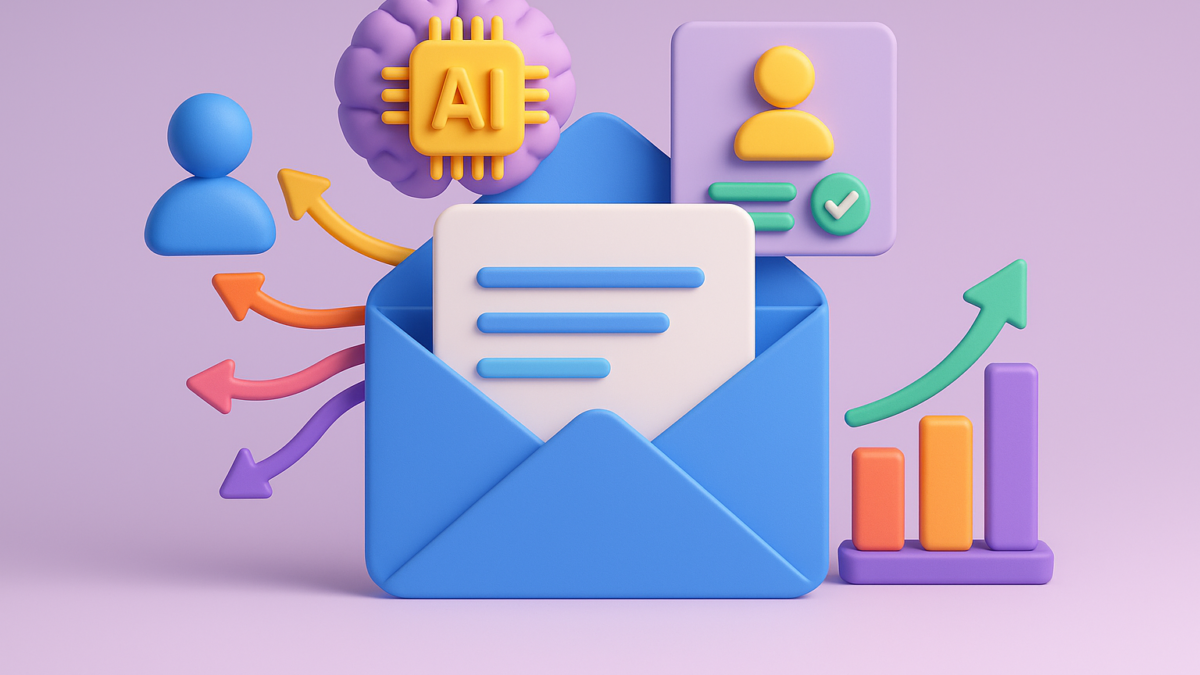AI-Powered Personalisation in Email Marketing for Higher Conversions
Table of Contents
Introduction: The End of One-Size-Fits-All Emails
Email marketing has long been a cornerstone of digital strategy. Yet in 2025, sending generic “blast” emails is no longer enough to stand out in crowded inboxes. Today’s consumers expect personalized, relevant, and timely messages that resonate with their individual needs.
This is where AI-powered personalization steps in. By analyzing customer data at scale, artificial intelligence allows marketers to craft hyper-targeted campaigns that drive higher engagement, stronger loyalty, and ultimately, better conversions.
Why Personalization Matters in 2025
- Inbox Saturation: The average consumer receives more than 100 emails daily, making attention harder to capture.
- Evolving Expectations: Customers now demand that brands “know them” and offer tailored experiences.
- Revenue Impact: Research shows that personalized emails deliver 6x higher transaction rates compared to generic ones.
In other words, personalization is no longer optional—it’s the difference between being ignored and being remembered.
How AI Elevates Email Personalization
Traditional personalization used basic tactics like inserting a first name in the subject line. AI takes this further by using data to predict, adapt, and automate personalization at scale.
1. Dynamic Segmentation
AI algorithms go beyond static lists by grouping customers based on real-time behaviors, purchase history, and predicted intent. This ensures every campaign targets the right audience.
2. Predictive Content Recommendations
Just like Netflix recommends shows, AI can suggest the right products, blogs, or offers to feature in each email—driving higher engagement.
3. Send-Time Optimization
AI analyzes individual user habits to determine when they are most likely to open emails, ensuring better open rates.
4. Natural Language Processing (NLP) for Subject Lines
AI can test and optimize subject lines for tone, sentiment, and performance, increasing click-through rates.
5. Automated Personalization at Scale
With AI, brands can deliver millions of personalized variations of the same campaign—something impossible with manual segmentation.
Real-World Applications of AI-Powered Personalization
E-commerce
AI-powered personalization helps online retailers recommend products based on browsing history, cart abandonment, and seasonal trends—boosting purchase likelihood.
SaaS Companies
AI-driven email campaigns can suggest features or tools users haven’t tried yet, improving engagement and retention.
Financial Services
Banks and fintech apps use AI to deliver personalized financial tips, credit offers, or alerts based on user spending patterns.
B2B Marketing
For enterprise marketers, AI can syndicate whitepapers or case studies to segmented buyer personas, ensuring content relevance at every stage of the funnel.
Benefits of AI in Email Marketing
- Higher Open Rates: Send-time optimization ensures emails are read.
- Improved CTRs: Personalized subject lines and tailored offers drive more clicks.
- Increased Conversions: Customers are more likely to buy when offers are relevant.
- Reduced Unsubscribes: Fewer irrelevant emails mean better engagement and loyalty.
- Efficient Scaling: AI allows teams to run highly personalized campaigns without massive manual effort.
Best Practices for AI-Powered Personalization
- Start with Quality Data
AI is only as good as the data it learns from. Ensure your CRM and email lists are clean, accurate, and GDPR/DPDP-compliant. - Test and Iterate
Use A/B testing to validate AI-driven recommendations and continuously refine performance. - Balance Automation with Human Touch
AI can generate personalization, but your brand voice and empathy must shine through. - Focus on Customer Value
Don’t just sell—use personalization to deliver real value, like tips, insights, or exclusive access. - Ensure Data Privacy
Be transparent about how customer data is used and ensure compliance with privacy laws.
Example: AI-Powered Campaign in Action
A fashion e-commerce brand used AI personalization for its email campaigns in 2024. Instead of sending the same promotions to all, AI segmented users by style preferences, browsing history, and purchase behavior.
- Customers who frequently bought athletic wear received recommendations for the latest sneakers.
- Formal wear shoppers received curated suggestions for suits and accessories.
- AI optimized send times individually—morning for professionals, evening for students.
The result?
- 25% increase in open rates
- 35% higher CTR
- 20% boost in overall conversions
The Future of AI in Email Marketing
By 2030, email campaigns will be almost entirely AI-orchestrated. Expect:
- Hyper-Personalized Campaigns: Each user receiving unique versions of the same email.
- Voice & Conversational AI: Integration with smart assistants to read and respond to email.
- Predictive Lifecycle Marketing: AI predicting churn and sending retention-focused campaigns proactively.
For marketers, the future is about mastering AI now to stay ahead of the curve.
Final Thoughts
AI-powered personalization is transforming email marketing from generic outreach into data-driven, conversion-focused communication. In 2025, brands that embrace this shift will see higher ROI, stronger customer relationships, and a competitive edge.
Call-to-Action (CTA)
Ready to take your email marketing to the next level?
Discover how AI-driven personalization and smarter content distribution can accelerate your campaigns. Learn more about Whitepaper Syndication and combine the power of AI and content marketing to maximize conversions.





